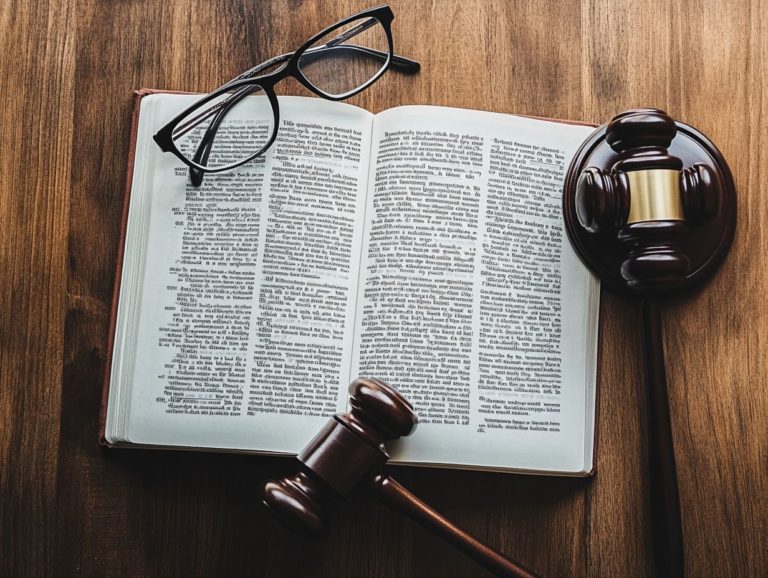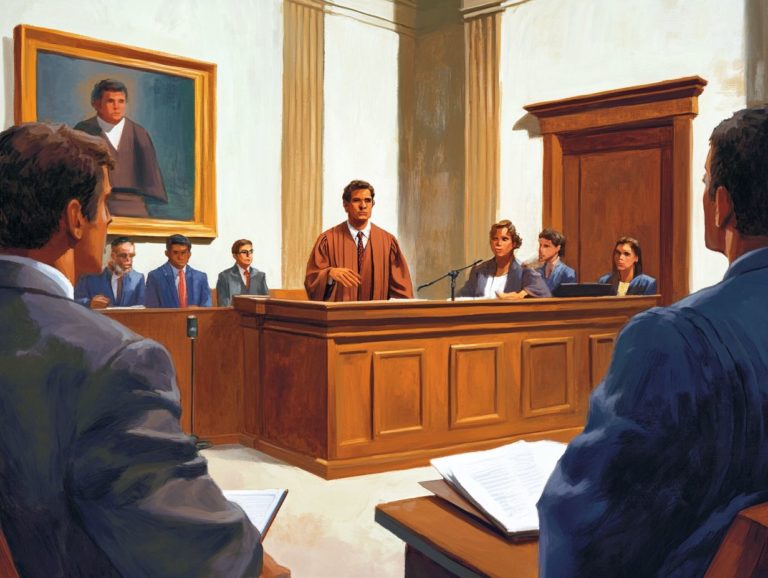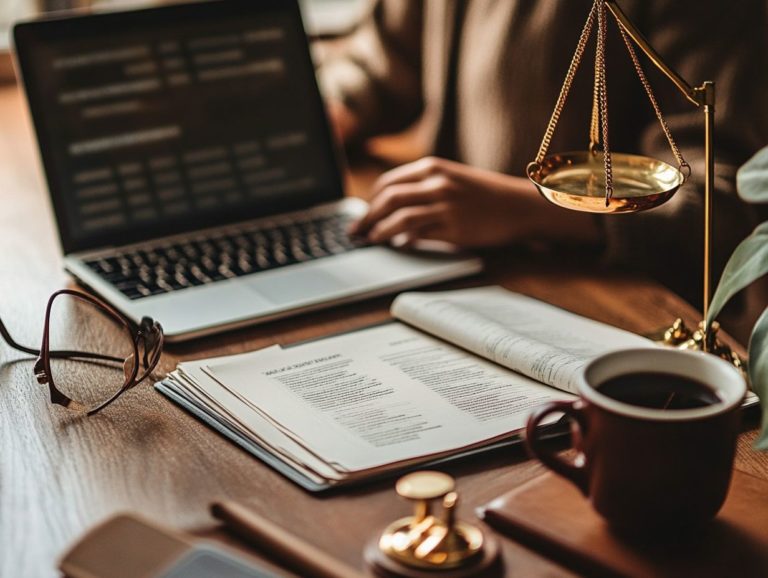What Is a Hearing in Criminal Court?
Navigating the criminal justice system can feel daunting. This overview simplifies court hearings by outlining their types, roles, and what to expect.
You will learn about the rights of the accused, potential outcomes, and practical tips for preparation. If you want to grasp criminal court hearings, you ve found your guide!
Contents
Key Takeaways:
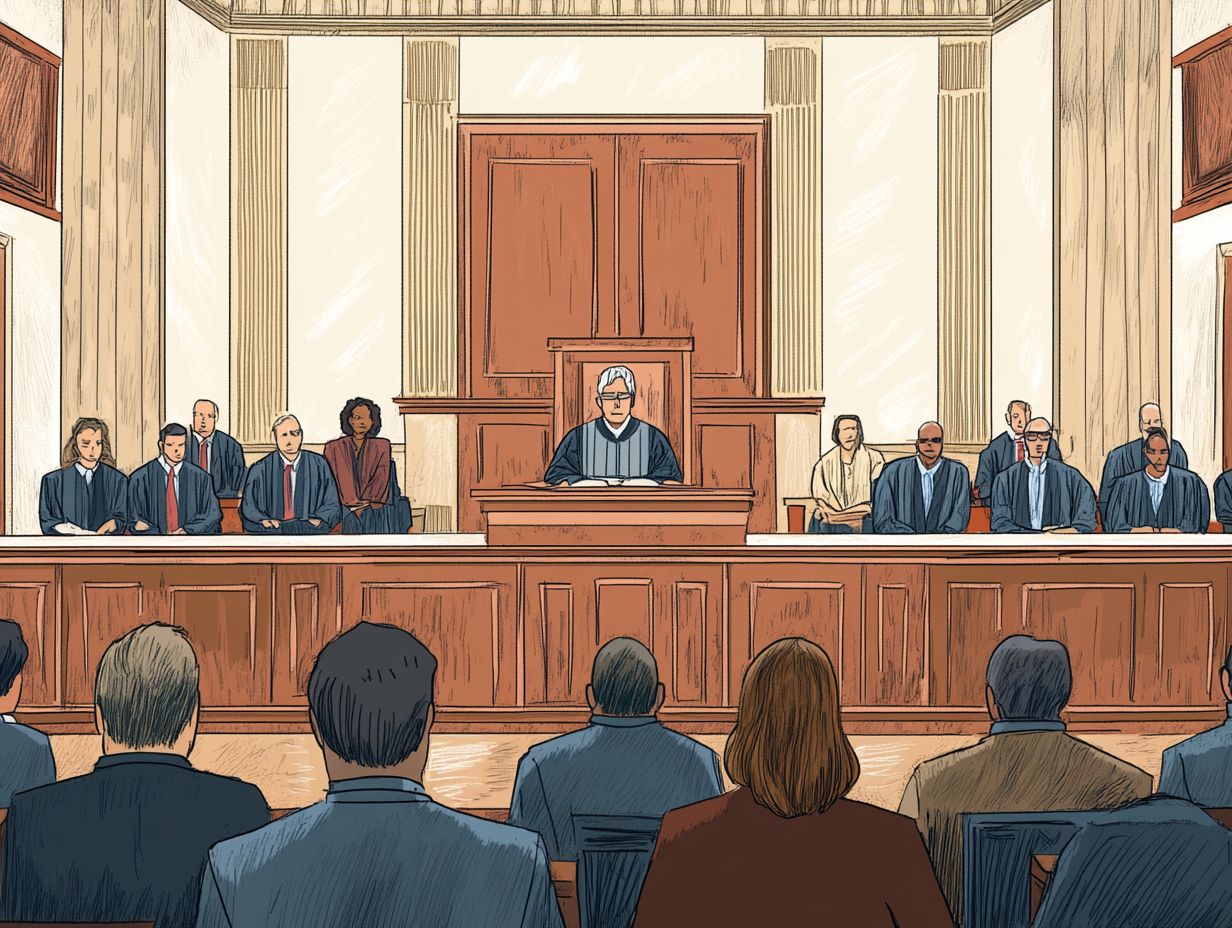
A criminal court hearing is a legal meeting to determine a defendant’s guilt or innocence.
Hearings ensure fair treatment for the accused and uphold their rights.
The accused has the right to an attorney, present evidence, and challenge the prosecution’s case during hearings.
Overview of Criminal Court Hearings
Criminal court hearings are vital to the judicial process. They handle cases against defendants facing criminal charges.
In the Denver District Court, you ll experience various hearings, like arraignments and trials. Each has a unique role in the prosecution’s case.
The judge ensures that legal standards are maintained while protecting the rights of the accused.
Types of Hearings
You will encounter different types of hearings in the criminal court system. Each hearing addresses specific legal stages, like arraignments and trials.
These hearings help your case move through the legal system while safeguarding your rights.
An arraignment is your first court appearance. Here, you are formally charged and asked to enter a plea.
A preliminary hearing helps determine if there is enough evidence to move forward to trial, protecting you from baseless charges.
Each hearing clarifies legal issues and influences the trajectory of your case, impacting plea deals and defense strategies.
The Role of a Hearing in the Criminal Justice System
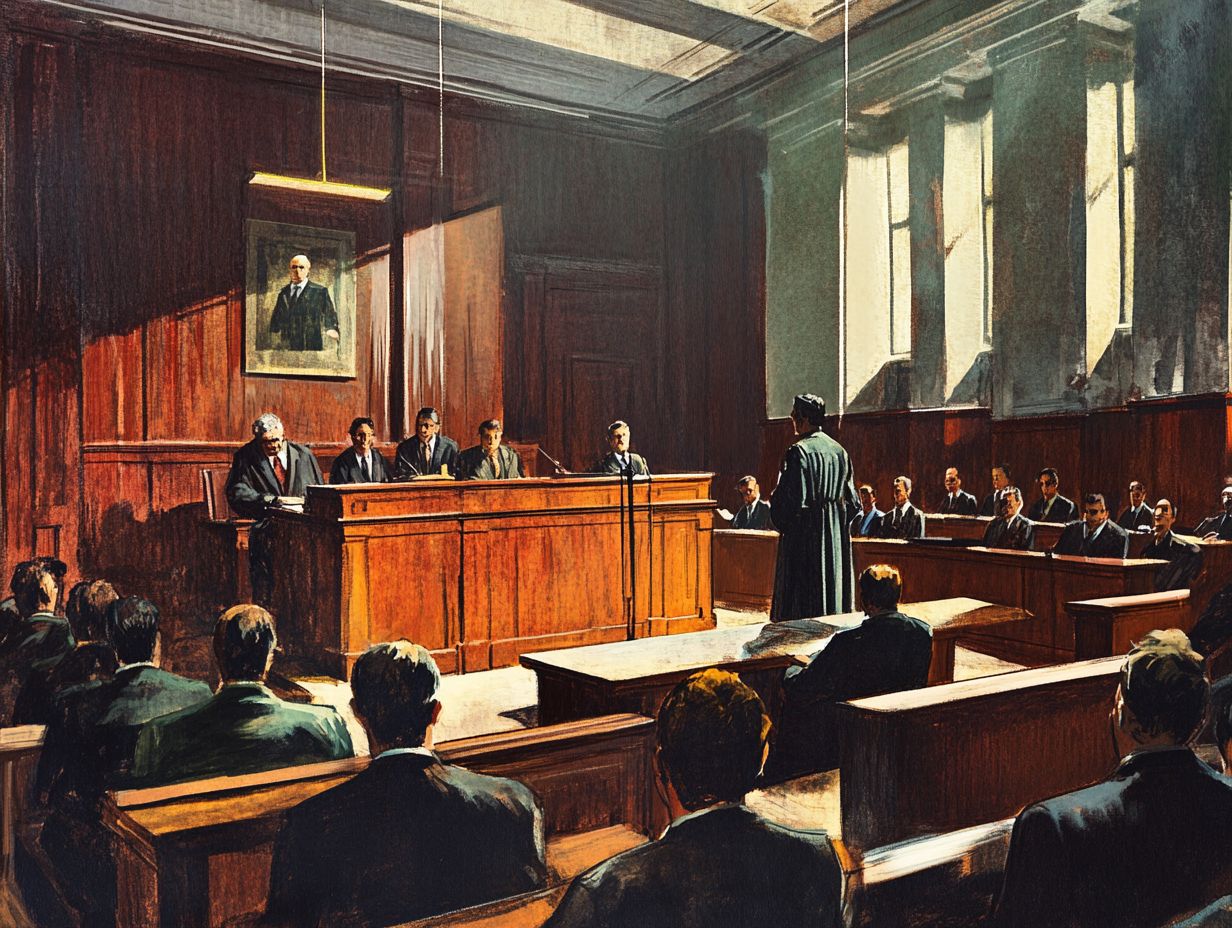
Hearings are crucial in the criminal justice system. They enforce the legal frameworks that govern arrests and prosecution.
Presided over by a judge, hearings allow for a detailed examination of evidence and motions, leading to crucial decisions like verdicts.
Purpose and Importance of Hearings
Hearings uphold justice and due process. They ensure you receive your legal rights while the prosecution presents its case.
These hearings provide a platform for examining evidence and establishing facts. Both parties argue their positions before an impartial judge.
They also protect your rights. Your legal representation can challenge any potential violations.
By allowing thorough scrutiny of evidence, these hearings contribute to a fair legal process. They help guide informed verdicts that reflect the allegations accurately.
The outcomes of these hearings can significantly impact your life and the integrity of the justice system as a whole.
What Happens During a Criminal Court Hearing?
During a criminal court hearing, you’ll encounter several pivotal steps that shape the outcome of the case.
This process involves the presentation of evidence, the prosecution’s arguments, and various legal motions put forth by both the defense and the prosecution.
Each stage of the hearing is structured to uphold fairness and legality, enabling the judge to evaluate the arguments and evidence before arriving at a verdict.
Step-by-Step Process
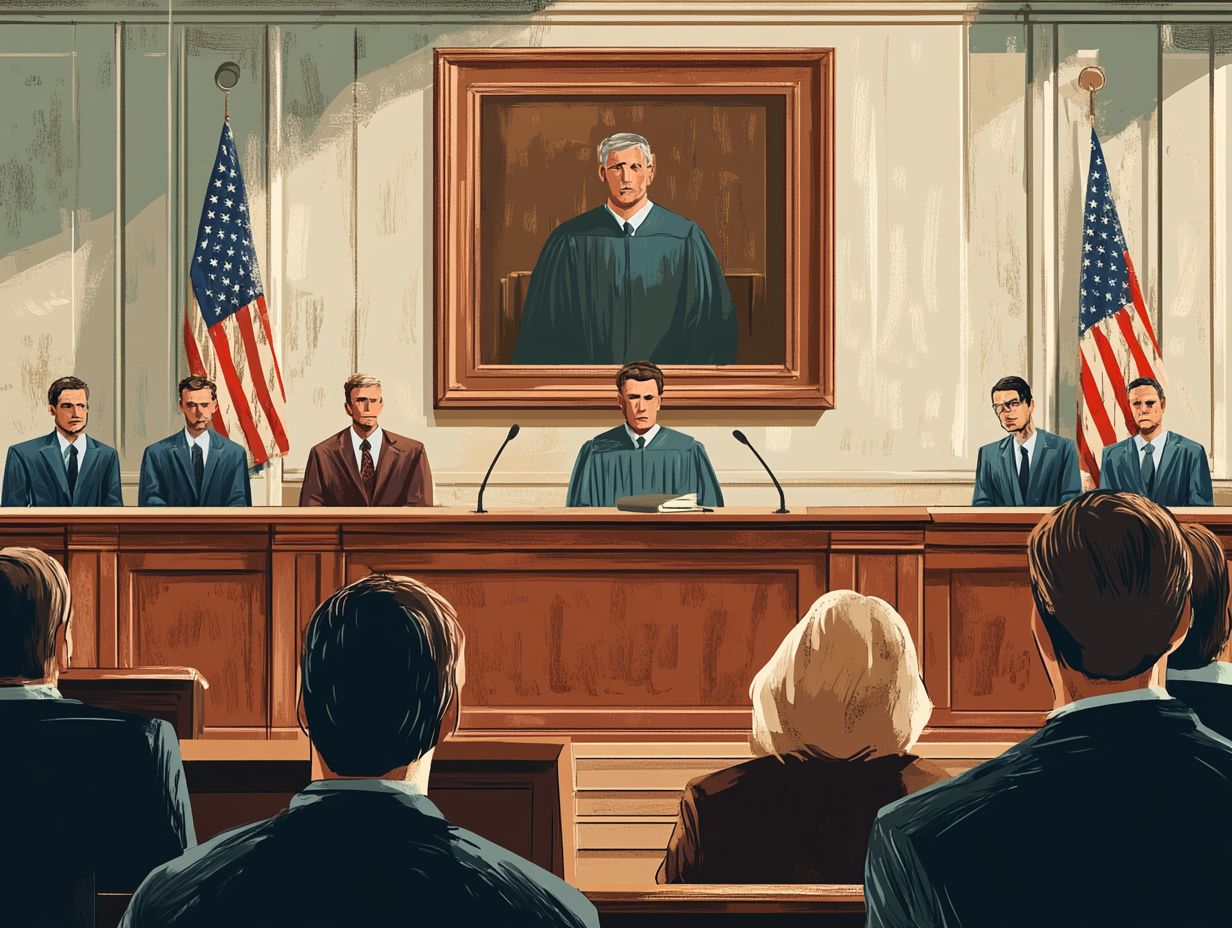
The step-by-step process of a criminal court hearing begins with the initial court appearance, where you, the defendant, are formally charged and have the opportunity to enter a plea.
This is a crucial moment, as the court lays out the official charges and ensures that you fully understand your rights.
After the initial court appearance, the proceedings shift to the presentation of evidence.
Here, both the prosecution and defense present their cases by calling witnesses, submitting documents, and introducing relevant exhibits to support their arguments.
After this phase, either side can file requests to throw out evidence, which the judge will carefully consider.
As the hearing unfolds, the judge meticulously evaluates the evidence presented, leading to a verdict that determines your guilt or innocence.
The process is thorough, designed to uphold justice and ensure that every detail is scrutinized.
Rights of the Accused During a Hearing
The rights of the accused during a hearing are essential to ensuring that justice is served fairly.
These rights are rooted in constitutional protections that guarantee legal representation, allowing you access to a public defender when needed.
They empower you to actively engage in your defense, challenge the evidence brought forth by the prosecution, and pursue a trial process that truly upholds the principles of justice.
Constitutional Protections
Constitutional protections are crucial to your rights as an accused individual.
They guarantee that you are entitled to a fair trial and due process under the law.
These protections, primarily found in the Sixth and Fourteenth Amendments, establish a framework that allows you to challenge any charges against you in a transparent manner.
Your right to counsel ensures you have access to legal representation, enabling you to present evidence and arguments in your defense effectively.
The principle of double jeopardy protects you from being retried for the same offense.
Additionally, the right to a speedy trial ensures you aren t left in a prolonged state of anxiety.
Courts actively protect these rights, carefully scrutinizing procedural actions and swiftly addressing any violations.
This commitment reinforces the integrity of the judicial system, giving you the power in your pursuit of justice.
Possible Outcomes of a Hearing

The potential outcomes of a criminal court hearing can vary significantly, presenting a spectrum that ranges from the dismissal of charges to a plea bargain or a full trial.
Each scenario carries substantial implications for both the defendant and the prosecution, shaping their respective paths forward.
Dismissal, Plea Bargain, or Trial
The options of dismissal, plea bargain, or trial are the primary pathways you encounter after a criminal court hearing.
Each option carries its distinct legal repercussions and procedural requirements.
As you navigate the complexities of the judicial system, grasping these pathways is essential.
Dismissal can bring an abrupt end to your case, often due to insufficient evidence or procedural missteps, significantly alleviating your stress.
Conversely, choosing a plea bargain opens the door to negotiation, typically leading to reduced charges or lighter sentences in exchange for a guilty plea.
This can be a game-changer for you!
Opting for a trial, however, thrusts you into an unpredictable arena, where a jury or judge weighs the facts, and the stakes could alter the course of your life.
Each route presents its own legal implications that you must thoroughly contemplate before making your choice.
Preparing for a Criminal Court Hearing
Preparing for a criminal court hearing requires careful planning and close collaboration between you and your defense attorney.
It s essential to ensure that all necessary evidence and motions are well-organized and presented effectively in court. Every detail matters, and your proactive involvement is crucial to achieve the best results.
Tips and Strategies
Effective preparation for a hearing demands a blend of strategic planning and a firm grasp of legal protocols. This significantly improves your chances of securing a favorable outcome.
Understanding courtroom etiquette is key. By collaborating closely with your attorney, you can present your case in a more compelling light.
Familiarizing yourself with the specific legal nuances related to your situation is crucial. Practicing clear and respectful communication builds your credibility with the judge and prosecution, fostering a cooperative atmosphere in the courtroom.
Engaging in role-playing scenarios with your legal team can further bolster your confidence. This will equip you to tackle questions and anticipate objections during the hearing.

